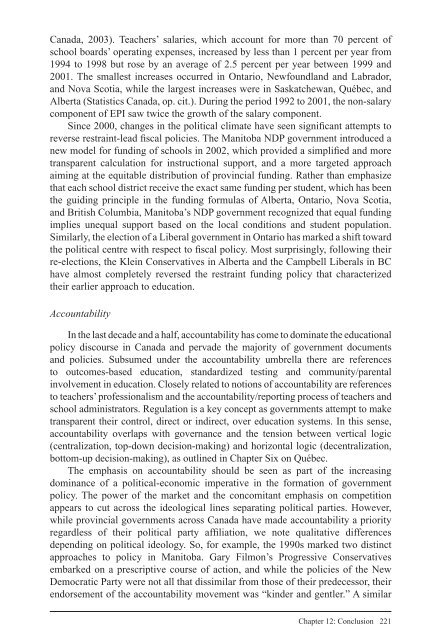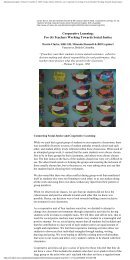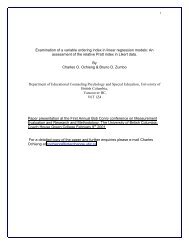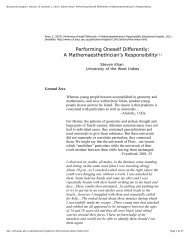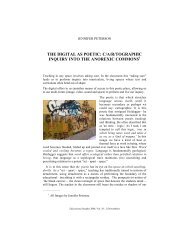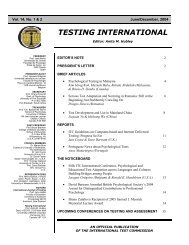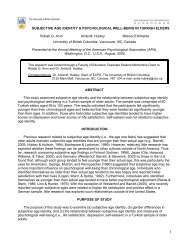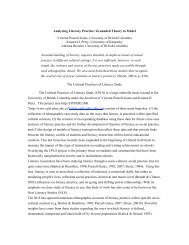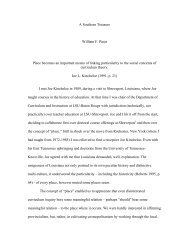The evolution of professionalism - Centre for Policy Studies in ...
The evolution of professionalism - Centre for Policy Studies in ...
The evolution of professionalism - Centre for Policy Studies in ...
You also want an ePaper? Increase the reach of your titles
YUMPU automatically turns print PDFs into web optimized ePapers that Google loves.
Canada, 2003). Teachers’ salaries, which account <strong>for</strong> more than 70 percent <strong>of</strong><br />
school boards’ operat<strong>in</strong>g expenses, <strong>in</strong>creased by less than 1 percent per year from<br />
1994 to 1998 but rose by an average <strong>of</strong> 2.5 percent per year between 1999 and<br />
2001. <strong>The</strong> smallest <strong>in</strong>creases occurred <strong>in</strong> Ontario, Newfoundland and Labrador,<br />
and Nova Scotia, while the largest <strong>in</strong>creases were <strong>in</strong> Saskatchewan, Québec, and<br />
Alberta (Statistics Canada, op. cit.). Dur<strong>in</strong>g the period 1992 to 2001, the non-salary<br />
component <strong>of</strong> EPI saw twice the growth <strong>of</strong> the salary component.<br />
S<strong>in</strong>ce 2000, changes <strong>in</strong> the political climate have seen signifi cant attempts to<br />
reverse restra<strong>in</strong>t-lead fi scal policies. <strong>The</strong> Manitoba NDP government <strong>in</strong>troduced a<br />
new model <strong>for</strong> fund<strong>in</strong>g <strong>of</strong> schools <strong>in</strong> 2002, which provided a simplifi ed and more<br />
transparent calculation <strong>for</strong> <strong>in</strong>structional support, and a more targeted approach<br />
aim<strong>in</strong>g at the equitable distribution <strong>of</strong> prov<strong>in</strong>cial fund<strong>in</strong>g. Rather than emphasize<br />
that each school district receive the exact same fund<strong>in</strong>g per student, which has been<br />
the guid<strong>in</strong>g pr<strong>in</strong>ciple <strong>in</strong> the fund<strong>in</strong>g <strong>for</strong>mulas <strong>of</strong> Alberta, Ontario, Nova Scotia,<br />
and British Columbia, Manitoba’s NDP government recognized that equal fund<strong>in</strong>g<br />
implies unequal support based on the local conditions and student population.<br />
Similarly, the election <strong>of</strong> a Liberal government <strong>in</strong> Ontario has marked a shift toward<br />
the political centre with respect to fi scal policy. Most surpris<strong>in</strong>gly, follow<strong>in</strong>g their<br />
re-elections, the Kle<strong>in</strong> Conservatives <strong>in</strong> Alberta and the Campbell Liberals <strong>in</strong> BC<br />
have almost completely reversed the restra<strong>in</strong>t fund<strong>in</strong>g policy that characterized<br />
their earlier approach to education.<br />
Accountability<br />
In the last decade and a half, accountability has come to dom<strong>in</strong>ate the educational<br />
policy discourse <strong>in</strong> Canada and pervade the majority <strong>of</strong> government documents<br />
and policies. Subsumed under the accountability umbrella there are references<br />
to outcomes-based education, standardized test<strong>in</strong>g and community/parental<br />
<strong>in</strong>volvement <strong>in</strong> education. Closely related to notions <strong>of</strong> accountability are references<br />
to teachers’ pr<strong>of</strong>essionalism and the accountability/report<strong>in</strong>g process <strong>of</strong> teachers and<br />
school adm<strong>in</strong>istrators. Regulation is a key concept as governments attempt to make<br />
transparent their control, direct or <strong>in</strong>direct, over education systems. In this sense,<br />
accountability overlaps with governance and the tension between vertical logic<br />
(centralization, top-down decision-mak<strong>in</strong>g) and horizontal logic (decentralization,<br />
bottom-up decision-mak<strong>in</strong>g), as outl<strong>in</strong>ed <strong>in</strong> Chapter Six on Québec.<br />
<strong>The</strong> emphasis on accountability should be seen as part <strong>of</strong> the <strong>in</strong>creas<strong>in</strong>g<br />
dom<strong>in</strong>ance <strong>of</strong> a political-economic imperative <strong>in</strong> the <strong>for</strong>mation <strong>of</strong> government<br />
policy. <strong>The</strong> power <strong>of</strong> the market and the concomitant emphasis on competition<br />
appears to cut across the ideological l<strong>in</strong>es separat<strong>in</strong>g political parties. However,<br />
while prov<strong>in</strong>cial governments across Canada have made accountability a priority<br />
regardless <strong>of</strong> their political party affi liation, we note qualitative differences<br />
depend<strong>in</strong>g on political ideology. So, <strong>for</strong> example, the 1990s marked two dist<strong>in</strong>ct<br />
approaches to policy <strong>in</strong> Manitoba. Gary Filmon’s Progressive Conservatives<br />
embarked on a prescriptive course <strong>of</strong> action, and while the policies <strong>of</strong> the New<br />
Democratic Party were not all that dissimilar from those <strong>of</strong> their predecessor, their<br />
endorsement <strong>of</strong> the accountability movement was “k<strong>in</strong>der and gentler.” A similar<br />
Chapter 12: Conclusion 221


